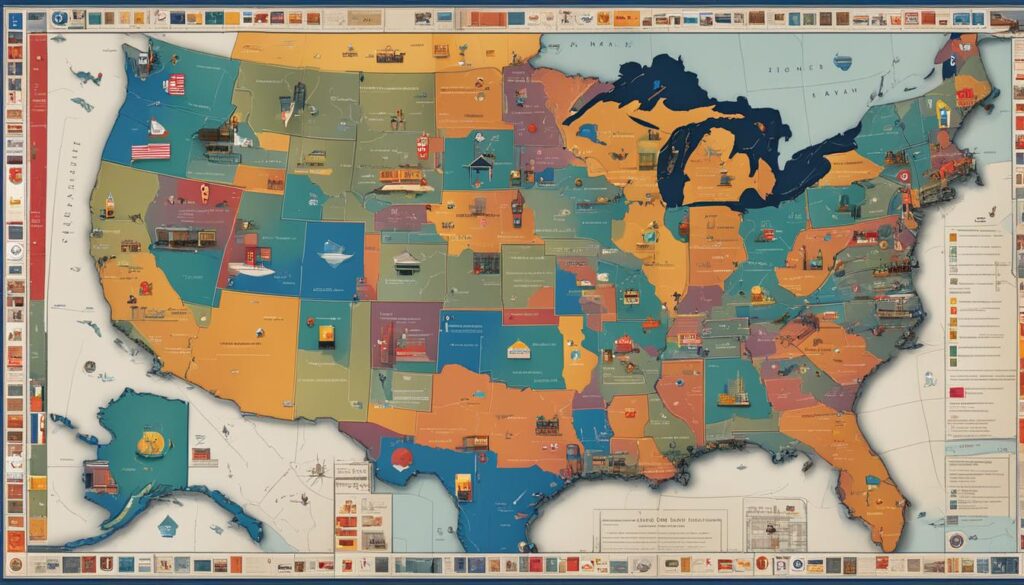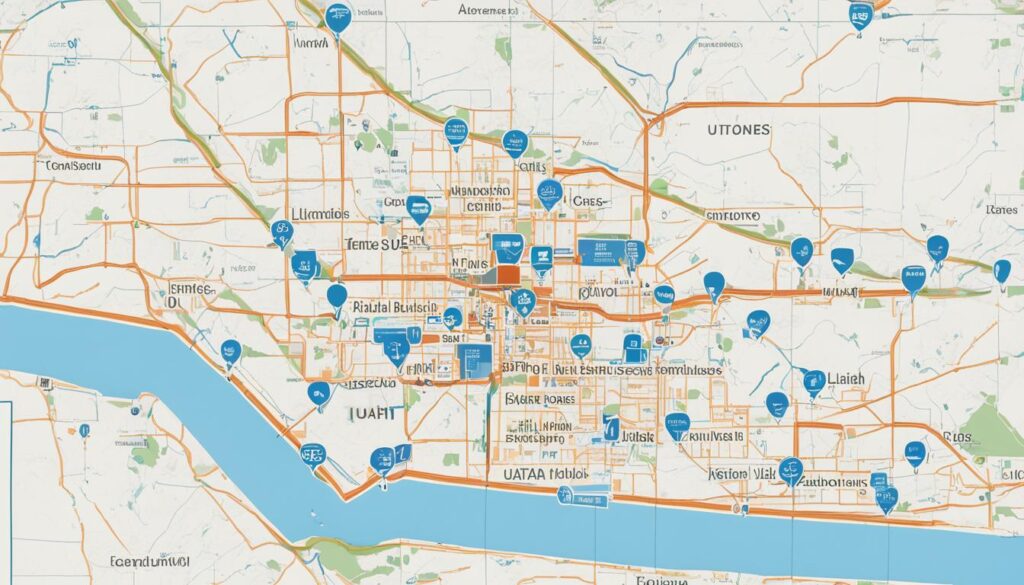If you’re stepping into the dynamic world of booth renting in the beauty industry, you might have crossed paths with the question of whether you need a business license for booth renters. With an ever-increasing number of cosmetologists and salon professionals seeking to carve out their niche as booth renters, it’s essential to wrap your head around the legal requirements for booth renters. In many U.S. states, these savvy entrepreneurs must wade through an intricate blend of regulations, such as maintaining a professional license and the potential need to secure a business license.
As an independent business owner operating inside a larger salon, you face unique financial and regulatory responsibilities distinct from those of traditional salon employees. Understanding whether your state requires a business license, or if your current professional certification suffices, forms the cornerstone of legally and successfully establishing your booth rental venture. Let’s unravel the complexities of business licensing and ensure your salon booth is not just a hub of creativity but also a beacon of compliance.
Key Takeaways
- Understanding the necessity of business licenses for booth renters is essential for legal operation.
- Business licensing requirements can vary significantly by state and local jurisdictions.
- Navigating the complexities of compliance can help you avoid legal and financial penalties.
- Booth renters are independent business owners within a salon and must account for their own tax and regulatory obligations.
- Professional licensure, while mandatory, may not be the only permit required to operate legally as a booth renter.
- Engaging with local small business resources or a legal professional can provide tailored guidance on securing the correct licenses.
Understanding the Booth Rental Business Model
As an independent contractor in the cosmetology industry, you might be considering the booth rental business model to adapt more control over your professional life. This innovative approach has transformed the way cosmetologists carve out their career paths by renting a workspace within a salon and operating as autonomous entrepreneurs. This arrangement comes with perks such as setting your work hours and selecting products that align with your brand.
Defining Booth Rental in the Cosmetology Industry
Booth rental is not merely acquiring a physical space—it’s about stepping into the realm of business ownership. It eradicates boundaries, offering you the latitude to establish your pricing, market your services, and build a personal brand. The independence provided by this model does, however, entail a comprehensive understanding of the requirements for booth renters, which include self-promotion and the meticulous management of business finances.
Independent Contractor vs. Employee: Navigating Salon Dynamics
As a booth renter, it’s crucial to distinguish your role as an independent contractor versus that of an employee. This status affects not only your work culture but also carries significant legal implications. Understanding these differences can inform your decisions when it comes to obtaining a business license as a booth renter or navigating the licensing process for booth renters. While the notion of acquiring permits for booth renters and handling taxation may seem daunting, it’s an integral responsibility that ensures your business’s legitimacy and opens the door to limitless growth opportunities. By embracing these obligations head-on, you position yourself for success in the competitive arena of cosmetology.
The Legal Implications of Being a Booth Renter
When you step into the world of booth renting within the cosmetology industry, you’re not just crafting beautiful looks; you’re also shaping a business. Understanding the legal requirements for booth renters is paramount. It’s not all about creative prowess—there’s a crucial administrative side too. Before you can even wield your scissors, obtaining a business license as a booth renter in most states is a must. This piece of paper is your golden ticket to legally operating within the salon’s walls.
As you prep your beauty haven, remember that navigating the insurance maze for booth renters can be just as intricate as the most complex braids. Insurance isn’t merely an option; it’s essential protection for your business’s vitality against any potential claims and liabilities. Ensure you have a solid safety net—a suite of insurances as part of your business toolkit.
Here’s a quick checklist to guide you on the legal path:
- Professional Cosmetology License: Your artistry passport; ensure it’s up-to-date.
- Business License: Required in many states, it distinguishes you as an official business entity.
- Contracts: Shields for both parties—clearly outline rental terms, expectations, and responsibilities.
- Insurance: The backbone of your risk management strategy, from liability to property.
Delving into the paperwork might seem daunting, but it’s these details that fortify the foundation of your business. So, embrace the journey with confidence, knowing you’re building your enterprise on solid legal ground.
Navigating State Laws and Licensing for Booth Renters
As a booth renter, your success hinges not just on your talent but also on staying legally compliant. It’s essential to be aware that the requirements for licensing for booth renters are not uniform across all states. Navigating the state-specific booth rental laws can be a complex process, but understanding these regulations is a crucial step in solidifying your business’ foundation.

State-Specific Rules for Booth Rental Operations
Each state in the U.S. maintains its own set of rules when it comes to booth rentals. Some states might have specific permits for booth renters, while others focus more on professional and health regulations. For instance, you might be in a state that requires a distinct business license for booth renters or you may be in one that allows you to operate under the salon’s umbrella license. It’s crucial to familiarize yourself with these legal requirements for booth renters to ensure you’re operating lawfully and avoid potential penalties.
- Check with your state board of cosmetology for detailed licensing information.
- Investigate if your state requires you to carry individual liability insurance.
- Understand the mandates around health and safety certifications in your locale.
The Importance of Compliance with Your Local Department of Labor
Remaining in good standing means not just adhering to cosmetology best practices, but also ensuring compliance with the Department of Labor. This could mean designating yourself as an independent contractor, which may involve additional criteria and even a separate form of licensure. Your standing as an independent contractor is determined by specific criteria, and meeting these is paramount to maintaining your operational autonomy.
- Ascertain if you need an independent contractor license in your region.
- Review local labor laws to confirm your status as a booth renter is clearly defined and protected.
- Document and keep records of your independent status and any related permits to prevent misclassification.
Embracing the responsibilities that come with your freedom as a booth renter is necessary and ultimately rewarding. Stay proactive about following your state’s booth rental laws and requirements to ensure your business thrives within the legal frameworks. Consult local resources, keep informed about changes in legislation, and never hesitate to seek professional advice when uncertain about your contractual or licensing obligations.
Do Booth Renters Need a Business License?
If you’re a cosmetologist or stylist venturing into the realm of booth renting, one of the frequently asked questions is: do booth renters need a license? The answer isn’t uniform across the board—it hinges on the rules and regulations specific to your state. As a booth renter, you are essentially an independent entrepreneur, and that status can come with the requirement of holding a business license.
Your responsibility as a booth renter often goes beyond simply possessing a professional cosmetology license. It’s not uncommon for states to mandate that you obtain certain permits for booth renters as well. These permits could range from a general business license to specific health and safety authorizations depending on the services you offer.
Asking “do I need a license as a booth renter?” is the right starting point. However, delving into the intricacies of local regulations will help you navigate the legal landscape effectively. Therefore, it’s imperative that you:
- Consult with your local Board of Cosmetology or similar regulatory body to gather accurate information concerning licensing requirements.
- Verify if you need a separate business license or if there are any exceptions based on your location or the scale of your business operations.
- Understand other applicable permits, such as those related to health department standards, which could impact the legality of your services.
- Clarify any special conditions that may apply for booth renters within city or county jurisdictions beyond state-level regulations.
Securing the correct permits and licenses is not only about legality; it ensures you establish credibility with clientele and lays a foundation for the long-term success of your personal brand within the beauty industry.
Deciding Between a Fixed Space or Freelancing
As a cosmetologist, entering the world of independent styling offers you two distinct paths—establishing your craft within a fixed booth rental or embracing the advantages of freelancing in cosmetology. Both options come with their unique set of benefits and challenges, but the decision largely hinges on your personal preferences, career goals, and the realities of the licensing process by location.
Pros and Cons of Fixed Booth Rental vs. Mobile Freelancing
Opting for a fixed booth rental in an established salon means you’ll benefit from a permanent workspace and steady foot traffic, which are essential for cultivating a loyal clientele. The amenities, from high-end salon equipment to a welcoming reception area, are provided. Yet, the drawbacks of booth renting can’t be ignored—higher overhead costs, stringent contracts, and less flexibility in your schedule might be among the contemplations.
On the other hand, freelancing allows you to be nimble. You’ll enjoy the liberty to set your own hours and select client locations. Nevertheless, being a freelance cosmetologist means more legwork for marketing your services and potentially unpredictable income streams.
How Location Affects Licensing Requirements
Your decision might also be swayed by the legalities of your practice. Location-based business licensing can be a looming hurdle for booth renters. Conducting business in metropolitan areas might require navigating through a denser thicket of regulations and obtaining additional permits. The licensing process for booth renters can range from straightforward to complex, and it’s imperative to be aware of the legal requirements for booth renters by location to ensure full compliance.
Whether you choose to rent a fixed location or carry your shears as a freelancer, you must consider how your environment intersects with professional licensing, and be ready to adapt to the local business landscape, maintaining legality and optimal service for your clients.
Setting up Shop: Permits and Paperwork for Your Booth
When embarking on the journey as a booth renter, you’re starting a business of your own within the bustling environment of a salon. It’s an exciting venture, but it’s imperative to build it on a foundation of proper documentation. The right permits for booth renters and necessary paperwork for booth renting are the bedrock of a legitimate and thriving enterprise, and their absence could steer you into turbulent waters of legal complications and potential fines.
- A current and valid cosmetology license – your skill certification and the gateway to offering beauty services legally.
- A business license for booth renters – to validate your operation as a legitimate entity under local and state law.
- Additional permits – depending on the services you offer, extra health, or sanitation permits may be required.
You might also require a certificate of occupancy if your booth operation is considered a separate business entity within the salon. Remember, skimping on this legally binding paperwork for booth renting might save you time initially, but it isn’t worth the risk of penalties and damage to your professional reputation.
Peace of mind comes with knowing you’ve checked all the boxes, allowing you to focus on what you do best: refining your craft and providing an exceptional experience to your clients. Let’s ensure your entrepreneurial spirit isn’t dampened by overlooked formalities. Navigate through the legal landscape with confidence by obtaining all the necessary permits for booth renters, and solidify the legitimacy of your business aspirations.
Renting a Salon Chair: What You Must Know
As you step into the entrepreneurial world of booth renting within the beauty industry, comprehending the intricacies of salon chair rental contracts is key to a thriving practice. As you navigate this journey, ensure you’re fully versed in crafting a rental agreement for booth renters and the responsibilities that come with it.

Creating a Strong Rental Agreement
Your success lies in the details of your rental agreement. A thoughtfully laid out contract not only outlines clear terms but also sets the foundation for a professional working relationship. Here’s what you should focus on:
- Delineate lease rates and payment schedules to avoid any future financial disputes.
- Specify the length of your contract and any renewal options to secure your business’s future.
- Include clear terms for the use of salon space and equipment, as well as utility access, so both parties are aware of what is included.
- Add cancellation clauses to protect yourself in unexpected situations.
Incorporate these elements into your salon chair rental contracts meticulously to avoid issues down the line and to maintain a mutually beneficial relationship with your salon owner.
Insurance and Liability Considerations for Renters
When it comes to booth renting, protecting your business with the right insurance policies is as crucial as your craft. Here are the must-have booth renters insurance requirements:
- Liability insurance: An essential safeguard against claims arising from accidents or injuries occurring in your workspace.
- Health and disability insurance: Protecting your well-being should be paramount, given that unforeseen events can affect your ability to work.
- Property insurance: Cover damages to your equipment or rental space from theft, fire, or other disasters.
Remember, considering liability considerations for booth renting isn’t just prudent; it’s often a requirement within your rental agreement. Going the extra mile with protective insurance for booth renters can be the difference between a minor setback and a major upheaval in your professional life.
Embarking on the journey of renting a salon chair calls for a proactive approach to creating solid agreements and ensuring comprehensive insurance coverage. Embrace these responsibilities as the backbone of your independent enterprise, and you’ll pave the way for a flourishing career in the beauty industry.
Financial and Tax Considerations for Booth Renters
As a booth renter, navigating your tax obligations and managing finances are as crucial to your success as the quality of the services you provide. Dealing with these aspects might not be as glamorous as transforming a client’s look, but they’re essential in sustaining a profitable and compliant business.
Income reporting for independent contractors in salons
is a topic that deserves your full attention. Unlike traditional employees, you’re in charge of tracking every dollar you earn and reporting it accurately to the Internal Revenue Service (IRS).
Let’s break down some financial pointers:
- Keep meticulous records of all your transactions; it’s not just best practice, it’s your financial safety net.
- Understand which tax forms you need to file. A Schedule C form is often the go-to for independent contractors to report profits or losses.
- Don’t wait until the last minute to handle your taxes — staying ahead of quarterly payment deadlines prevents penalties.
And when it comes to expenses, remember:
- Identify deductible business-related expenses such as supplies, rent payments for your booth, and even some utilities.
- Consult with a tax professional who can guide you on possible deductions like health insurance and retirement plans — items that not only benefit your present but your future, too.
- Embrace technology and consider using modern accounting software designed for small business owners, which can streamline the tracking of your finances and prepare you for tax time.
Lastly, keep learning. Staying informed about financial management and tax laws as they apply to independent contractors can save you money and legal headaches. Be proactive about your financial health and watch your business flourish.
Maintaining Professional Standards as a Booth Renter
As a booth renter, not only do you get to enjoy the freedom of managing your own workspace, but you also bear the responsibility of upholding the highest professional standards. Meeting certification requirements in cosmetology and understanding salon safety protocols are integral to your success and credibility as an independent contractor. Let’s dive into what it means to maintain your professional standards through health and safety compliance and ongoing education.
Meeting Health and Safety Certifications
To ensure you’re providing a safe and hygienic experience for your clients, it’s essential that you comply with health and safety standards for booth renters. From sterilization of your tools to proper waste disposal, these certifications signify your commitment to client welfare and industry excellence. Stay updated on the latest OSHA guidelines and partake in refresher courses that reinforce your knowledge of critical salon safety protocols.
Fulfilling Ongoing Education and License Renewals
The world of cosmetology is ever-evolving, and ongoing education in cosmetology is what keeps you at the forefront of the field. Whether it’s learning new techniques or understanding the latest beauty trends, professional development for independent contractors is a continuous journey. Additionally, on-time license renewals for booth renters are non-negotiable. They not only ensure the legality of your services but also demonstrate your dedication to professional growth.
- Regularly attend workshops and seminars related to cosmetology.
- Invest in courses that offer certifications to expand your service offerings.
- Mark your calendar for license renewal deadlines and set reminders.
Embrace each opportunity for professional development, as it’s a testament to your excellence in the competitive industry of cosmetology.
Conclusion
Embarking on the journey of booth renting in the salon industry presents a unique blend of opportunities and responsibilities. As you consider the financial potential that comes with such a venture, it’s crucial to balance your ambitions with a comprehensive understanding of the legal and tax implications. Abiding by these regulations isn’t just a formality; it’s a critical step in solidifying the legitimacy and longevity of your enterprise.
Seeking salon booth rental legal advice should be a priority. Reaching out to experts in business law and tax accounting will assist you in ensuring that every aspect of your operation is up to code. They can provide a custom-fitted framework for your particular situation, reducing the risk of costly errors. This level of diligent preparation goes a long way in allowing you to focus on what you do best—providing exceptional beauty services.
In summary, your final thoughts on licensing for booth renters ought to highlight the importance of double-checking that all your permits, licenses, and paperwork are in order, as you carve out your niche in this vibrant industry. Maintain a pulse on both state mandates and IRS expectations, keeping your business strategies aligned for success. By treating the regulatory facets with the same care as your creative services, you can expect to build a robust, compliant, and profitable business model that thrives.
FAQ
Do booth renters need a business license?
Yes, in many cases, booth renters are considered independent business owners and need to obtain a business license according to state-specific regulations. Additionally, they must have a current professional license for the cosmetology services they offer.
What distinguishes a booth renter from a salon employee?
A booth renter operates as an independent contractor, managing their own clientele, setting their schedules, and handling personal finances. Conversely, a salon employee typically works under the management of the salon owner and may have less control over these aspects of their work.
Are there different legal requirements for booth renters compared to salon owners?
Yes, booth renters, as independent contractors, have different legal obligations, including obtaining applicable business licenses, adherence to tax regulations, and possibly needing a separate certificate of occupancy, depending on location and regulations.
How do state-specific rules affect booth rental operations?
Each state may have unique laws governing booth rental operations, including licenses required, health and safety standards, insurance mandates, and possibly restrictions on booth renting as a practice. It’s essential to understand and comply with these laws to operate legally.
What should be considered when creating a booth rental agreement?
A booth rental agreement should clearly state the lease rates, contract duration, cancellation terms, and what the rental fees entail, such as use of salon facilities and equipment. This document should clarify all terms to protect both parties legally.
What are some important insurance considerations for booth renters?
Booth renters should consider carrying personal liability, disability, and health insurance to protect against unforeseeable events like accidents or legal disputes. Adequate insurance coverage is often required as part of the rental agreement and helps safeguard the renter’s business.
Are there specific financial or tax responsibilities for booth renters?
Yes, as independent contractors, booth renters are responsible for their own tax filings, including paying quarterly estimated taxes. They must manage their finances, keep detailed records, and remain aware of deductible expenses to maintain their business effectively.
What are the benefits of choosing either fixed booth rental or mobile freelancing?
Fixed booth rental provides a consistent work location and access to the salon’s amenities but can include higher fees and a necessity for a detailed rental contract. Mobile freelancing offers flexibility and potential cost reduction at the expense of requiring more self-marketing and client management skills.
How does location affect licensing and permit requirements for booth renters?
Location influences the type of licenses and permits required for booth renters, with densely populated areas potentially imposing stricter regulations. Renters must consider factors like zoning laws, client accessibility, and market dynamics of the salon when evaluating location implications.
What certifications are necessary for upholding professional standards in a booth rental setting?
Booth renters must maintain health and safety certifications to comply with sanitation protocols and keep a safe environment for clients. Regular inspections and state-specific standards are required, as are ongoing education and professional license renewals for credibility and to stay updated with industry advancements.




